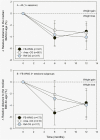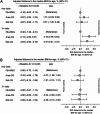Sustainability of weight loss from a family-centered pediatric weight management program integrated in primary care
- PMID: 34974835
- PMCID: PMC8720465
- DOI: 10.1186/s12913-021-07361-9
Sustainability of weight loss from a family-centered pediatric weight management program integrated in primary care
Abstract
Background: A 6-month pediatric weight loss program showed modest success, but the sustainability of this success after 12 months was unclear. The present study aims tomeasure the medium-term effectiveness of family-based weight management in pediatric primary care to reduce body weight in children living with obesity.
Methods: In a retrospective cohort study, children ages 3 to 17 years with obesity in Kaiser Permanente Orange County, California, who enrolled in a weight management program between April 2014 and December 2018 (FB-WMG, n = 341) were compared to children referred but not enrolled (Ref-CG, n = 317) and controls matched by sex, age, zip code and BMI (Area-CG, n = 801). The relative distance from the median BMI-for-age at months 0, 6, and 12 were expressed as difference-in-differences (DID) using multivariable linear regressions with robust standard error.
Results: The baseline BMI-for-age was 98.6 (SD 1.08) percentile in FB-WMG, 98.2 (SD 1.22) percentile in Ref-CG, and 98.6 (1.13 in Area-CG). FB-WMG had a median of 3 visits (P25 1 visit, P75 5 visits) in the first 6 months. Despite a more considerable decrease in the relative distance to the median BMI-for-age in FB-WMG children with 3+ visits after 6 months, the success obtained was not sustained at 12 months (DID FB-WMG vs Area-CG -0.34, 95% CI - 3.00 to 2.33%, FB-WMG vs Ref-CG -0.39, 95% CI - 3.14 to 2.35%). At 12 months, there was no statistical significant difference between the three groups (FB-WWG, Ref-CG, Area-CG).
Conclusions: The initial success in weight management was not sustained in the absence of continued support for healthy lifestyle changes. Based on current evidence, continued support is necessary to maintain and promote success beyond a brief 6 month intervention. Long-term pediatric weight management programs are needed to promote continuing progress.
Keywords: Body mass index; Family-centered; Obesity; Sustainability; Weight management.
© 2021. The Author(s).
Conflict of interest statement
The authors declare that they have no competing interests.
Figures



References
MeSH terms
LinkOut - more resources
Full Text Sources
Medical
Research Materials
Miscellaneous

